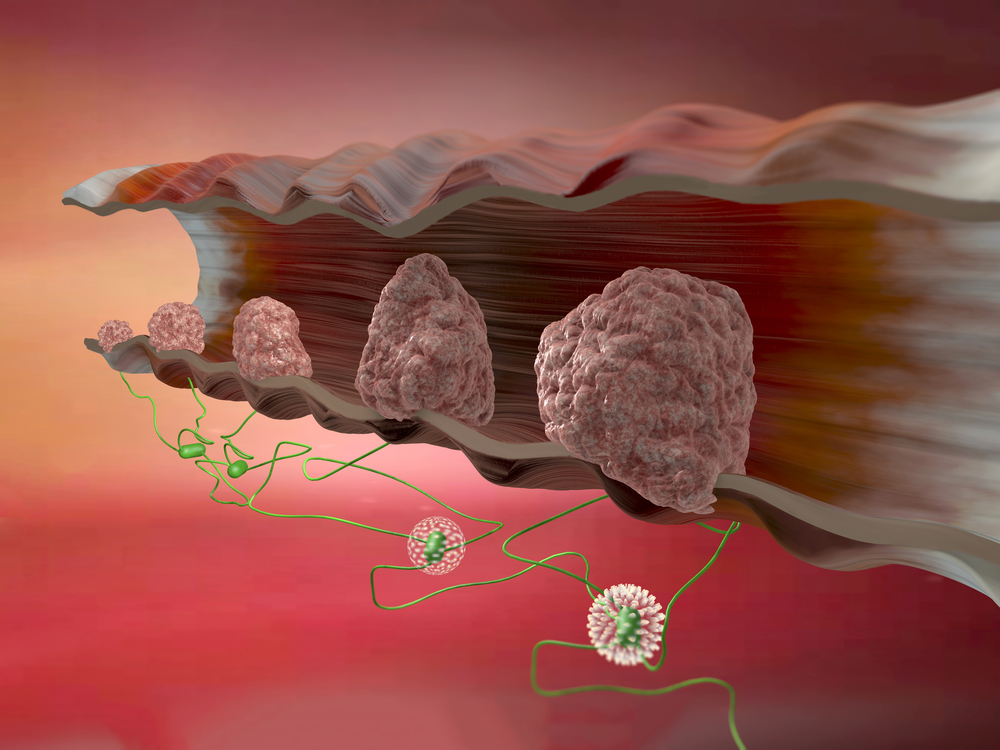In a new study entitled “Apc Restoration Promotes Cellular Differentiation and Reestablishes Crypt Homeostasis in Colorectal Cancer” a team of researchers showed that restoring the activity of a key gene, the Apc gene, was efficient in stopping colon tumor growth and re-establishing intestinal function in 4 days. The study was published in the journal Cell.
Colorectal cancer is responsible for 700,000 deaths in developing countries and is caused, in 90% of the cases, by mutations in a tumor suppressor gene, the Adenomatous Polyposis Coli (Apc) gene. While it is known that Apc harboring inactivating mutations initiates colon cancer, it remained unknown whether it also contributed to tumor growth and survival after the tumor is already established.
Lukas Dow, at Weill Cornell Medical College and study’s first author noted, “We wanted to know whether correcting the disruption of Apc in established cancers would be enough to stop tumor growth and induce regression.” Rescuing gene expression in mutated genes, however, can actually lead to their overexpression resulting in other detriment phenotypes in normal cells.
In this study, a team of researchers led by Scott Lowe from the Memorial Sloan Kettering Cancer Center overcame this technical issue with a new genetic technique that selectively targets the Apc gene. When the team suppressed Apc expression in a new mouse model, they observed mice developed colon cancer as humans, i.e., not only did they develop tumors in the small intestine (as did previous mouse models) they also developed tumors in the colon, as do human patients.
When authors reactivated Apc they were capable of halting tumor cells’ proliferation and rescue intestinal cells. As previously shown, this was mediated via the Wnt signaling, a pathway that is known to control cellular proliferation, migration and survival. In 2 weeks, mice had no signs of the tumor and relapse was prevented for a 6-month follow-up period. Of note, the team observed that rescuing Apc gene expression was an effective strategy to treat mice with tumors harboring key mutations that trigger tumorigenesis, specifically those in the Kras and p53 genes.
Dr. Dow noted, “The concept of identifying tumor-specific driving mutations is a major focus of many laboratories around the world. If we can define which types of mutations and changes are the critical events driving tumor growth, we will be better equipped to identify the most appropriate treatments for individual cancers.”
The team is now investigating how rescuing Apc expression impacts tumors that left its primarily location and have metastasised. “Treatment regimes for advanced colorectal cancer involve combination chemotherapies that are toxic and largely ineffective, yet have remained the backbone of therapy over the last decade. It is currently impractical to directly restore Apc function in patients with colorectal cancer, and past evidence suggests that completely blocking Wnt signaling would likely be severely toxic to normal intestinal cells. However, our findings suggest that small molecules aimed at modulating, but not blocking, the Wnt pathway might achieve similar effects to Apc reactivation. Further work will be critical to determine whether WNT inhibition or similar approaches would provide long-term therapeutic value in the clinic,” added Scott Lowe at the Memorial Sloan Kettering Cancer Center.


